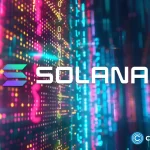
Arbitrum (ARB), a leading Ethereum (ETH) layer-2 solution, has just launched its Atlas upgrade, marking a crucial step in lowering transaction fees and boosting network efficiency.
Arbitrum’s Atlas upgrade is now live
Offchain Labs, the primary developer behind Arbitrum, has announced the successful activation of the ArbOS 20 upgrade, dubbed “Atlas,” on the Arbitrum network.
As part of the ArbOS 20 update, the Atlas upgrade integrates Ethereum’s Dencun support and introduces blob transactions to streamline data processing at a reduced cost. With the Atlas upgrade now live, Arbitrum plans to implement additional reductions in execution transaction fees on March 18th.
At first, the Atlas upgrade focuses on reducing layer-1 (L1) posting fees through EIP-4844, with further reductions scheduled for next week. Arbitrum states that Atlas aims to decrease the L1 surplus fee per compressed byte from 32 gwei to zero and lower the layer-2 (L2) base fee from 0.1 gwei to 0.01 gwei. Consequently, applications on Arbitrum One should reap the benefits of the new pricing structure without requiring any modifications.
According to Off Chain Labs, Layer 3 Rollup chains constructed atop Arbitrum One will automatically experience reduced fees.
Meanwhile, self-governed Orbit L2 rollup chains are encouraged to embrace ArbOS Atlas and enable blob posting to enjoy similar benefits.
Offchain Labs further highlights that Arbitrum RaaS (Rollups-as-a-Service) providers like Altlayer, Caldera, Conduit, and Gelato have committed to upgrading existing Orbit chains to support the Atlas upgrade and the Ethereum Dencun upgrade.
Moreover, the Atlas upgrade brings Arbitrum (ARB) in line with EVM’s security standards by incorporating support for EIP-6780. This paves the way for future improvements to the EVM.
Offchain Labs highlighted that by optimizing transaction costs, the Atlas upgrade will make previously impractical use cases like gaming, SocialFi, and DeFi exchanges viable.
The recent implementation of Ethereum’s Dencun upgrade, aimed at reducing gas fees on L2 blockchains, is expected to promote greater adoption of the Ethereum ecosystem. However, it’s important to note that immediate fee reductions are contingent upon project teams upgrading their architecture to accommodate the new standard.
Arbitrum’s upcoming ‘unlocking’ event
In the evolution of Arbitrum, a series of upgrades have played a pivotal role in shaping its capabilities and performance. Before the recent Atlas upgrade, key enhancements made on the network marked significant milestones for the blockchain project.
The Arbitrum Nitro upgrade, released in August 2022, was a crucial development that focused on boosting network capacity and speed to address scalability challenges within the Ethereum ecosystem. This upgrade aimed to improve transaction throughput and efficiency, laying a solid foundation for a more robust and scalable Layer 2 solution.
In related news, the Arbitrum DAO has opted to retract a proposal aimed at donating around $1.28 million worth of ARB tokens to aid in covering legal expenses for Tornado Cash developers Roman Storm and Alexey Pertsev. This choice comes following concerns voiced by token holders regarding the potential legal liabilities linked with these donations.
This proposal, involving a donation of approximately $1.28 million worth of ARB tokens, aimed to support legal charges against Tornado Cash developers.
However, concerns raised by token holders regarding potential legal risks associated with this donation led to the withdrawal of the proposal.
The willingness of the Arbitrum community to step up and offer financial support for legal matters highlights the collaborative nature of the cryptocurrency ecosystem, emphasizing the importance of legal clarity and responsibility within the industry.













